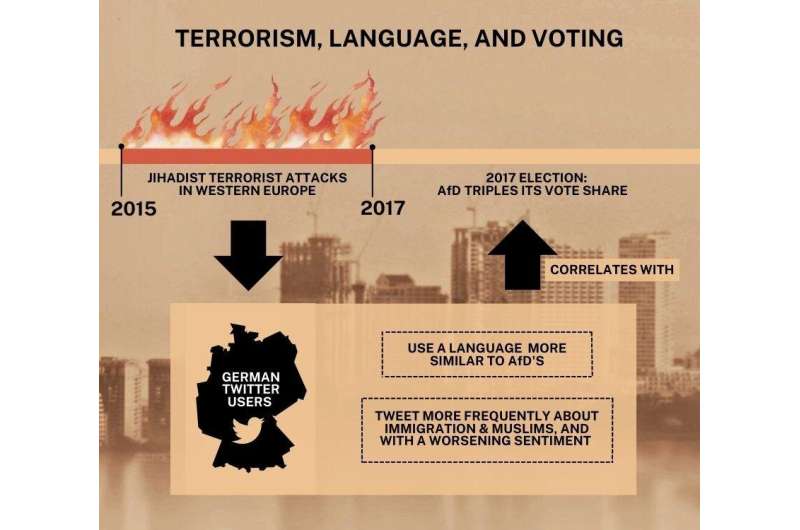This article has been reviewed according to Science X's editorial process and policies. Editors have highlighted the following attributes while ensuring the content's credibility:
fact-checked
peer-reviewed publication
proofread
How terrorism affects our language and the vote for the radical right

The experience of the jihadist terrorist attacks that plagued Western Europe between 2015 and 2017 shows that perceived threats from ethnic and religious minorities affect the tone of public discourse about immigration and the support for radical right parties, according to a new study published in the American Journal of Political Science, which uses German data, including more than 10 million tweets.
In that period, terrorist attacks and instances of crime involving minorities made immigration a more salient issue for voters, explain Bocconi scholars Francesco Giavazzi (Department of Economics) and Gaia Rubera (Department of Marketing), with former Bocconi students Felix Iglhaut (now at the LSE Ph.D. program) and Giacomo Lemoli (now at the New York University Ph.D. program) as co-authors. This induced German Twitter users to tweet more frequently, and with a worsening sentiment, about immigration and Muslims, thus making the language used by the public on Twitter more similar to the language used by the radical right party AfD (Alternative für Deutschland), which was pointing to the open border policy as posing a security threat for the German population.
The linguistic shift was, moreover, correlated with the intention to vote AfD, as measured by weekly Infratest Dimap polls, and by its electoral fortunes at the 2017 election, when the party entered the lower house of Parliament for the first time by almost tripling its vote share.
Language matters
Even if information provided by Twitter users about their location is, in many cases, unreliable, the authors were able to geolocate 189,368 Twitter users in 235 German constituencies out of 261. They identified 5,512 strictly local landmark Twitter accounts and assumed that any individual following at least three landmarks in the same constituency and no landmark outside it lives there. Using a natural language processing algorithm, they computed a daily measure of similarity between the language used by parties on Twitter and the language used by the public from a given constituency. This measure of similarity was used to infer the alignment of Twitter users in any constituency with national parties.
Eleven exogenous events (ten terrorist attacks across Europe and a criminal event involving North African and Arab men) allowed the authors to compare the language similarity in the presence and in the absence of such events.
Even if the largest effect of an event on tweet volume and sentiment and on language similarity is observed in the following week, a longer-term trend is also visible, with the volume of tweets about immigration and Islam growing over time, and their sentiment worsening. No traditional explanatory variable, such as education or social status, seems to play a role, whereas the magnitude of the effect is small following the first events and increases over time, suggesting that a consistent series of shocks is needed to condition public opinion.
Media and polarization
The study appears to downplay the role of traditional media. The German general public changed its discourse independently of newspapers. Contrary to what happened on Twitter, the volume of articles focused on immigration and Islam decreased over time and their sentiment was stable.
"Along with a large language shift towards AfD," Prof. Rubera said, "we also observed a smaller shift towards the language of the party at the other end of the political spectrum, Die Linke, at the expense of center parties. This suggests that another effect of religiously motivated terrorism has been a polarization of the German society."
"Since language similarity proved to be such a good predictor of voting intention at constituency level," Prof. Giavazzi said, "our study opens the prospect of using this methodology in place of, or alongside, traditional opinion polls. However, the academic world is worried about the possible end to the Twitter policy of allowing researchers free access to data. Neither a study such as ours nor the monitoring of voting intentions through the new methodology would be feasible anymore if access were to be regulated under the terms leaked a few days ago."
More information: Francesco Giavazzi et al, Terrorist Attacks, Cultural Incidents, and the Vote for Radical Parties: Analyzing Text from Twitter, American Journal of Political Science (2023). DOI: 10.1111/ajps.12764
Journal information: American Journal of Political Science
Provided by Bocconi University



















